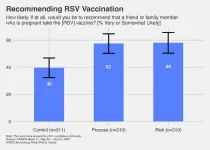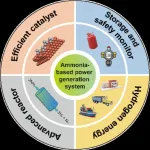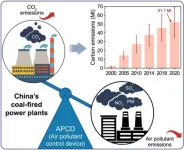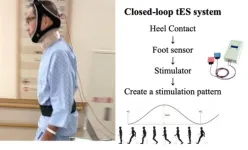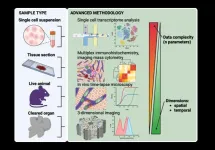(Press-News.org) Approximately 65% of adults in the United States consume sugar sweetened beverages daily. Chronic liver disease is a major cause of morbidity and mortality worldwide and can result in liver cancer and liver disease-related mortality. Researchers from Brigham and Women’s Hospital, a founding member of the Mass General Brigham healthcare system, led one of the first studies to look at the association between intake of sugar-sweetened beverages, artificially sweetened beverages, and incidence of liver cancer and chronic liver disease mortality. Results are published in JAMA.
“To our knowledge, this is the first study to report an association between sugar sweetened beverage intake and chronic liver disease mortality,” said first author Longgang Zhao, PhD, of the Brigham’s Channing Division of Network Medicine. Zhao is a postdoctoral researcher who works with senior author Xuehong Zhang, MBBS, ScD, in the Channing Division. “Our findings, if confirmed, may pave the way to a public health strategy to reduce risk of liver disease based on data from a large and geographically diverse cohort.”
This observational study included nearly 100,000 postmenopausal women from the large, prospective Women’s Health Initiative study. Participants reported their usual soft drink, fruit drink (not including fruit juice) consumption, and then reported artificially sweetened beverage consumption after three years. Participants were followed for a median of more than 20 years. Researchers looked at self-reported liver cancer incidence and death due to chronic liver disease such as fibrosis, cirrhosis, or chronic hepatitis, which were further verified by medical records or the National Death Index.
A total of 98,786 postmenopausal women were included in the final analyses. The 6.8 percent of women who consumed one or more sugar-sweetened beverages daily had an 85 percent higher risk of liver cancer and 68 percent higher risk of chronic liver disease mortality compared to those who had fewer than three sugar sweetened beverages per month.
The authors note that the study was observational, and causality cannot be inferred, and relied on self-reported responses about intake, sugar content and outcomes. More studies are needed to validate this risk association and determine why the sugary drinks appeared to increase risk of liver cancer and disease. Furthermore, more research is needed to elucidate the potential mechanisms by integrating genetics, preclinical and experimental studies, and -omics data.
Disclosures: Naughton reported grants from the National Institute of Aging (NIA) to The Ohio State University (to support the analysis and use of the Women’s Health Initiative [WHI] data for multiple publications during the conduct of the study; and grants from Merck Foundation (to support a research project not related to this article) outside the submitted work. Tobias reported grants from the National Cancer Institute (NCI) and grants from the National Institutes of Health/National Institute of Diabetes and Digestive and Kidney Diseases (NIH/NIDDK) during the conduct of the study. VoPham reported personal fees from Georgetown University (speaker honorarium); and grants from NIH/NIDDK (K01 DK125612), NIH/NCI (P20 CA252732; P30 CA015704), and NIH/NHLBI (National Heart, Lung, and Blood Institute; 75N92019R0030) outside the submitted work. Dr Manson reported grants from NIH during the conduct of the study and grants from NIH and Mars Edge outside the submitted work. No other disclosures were reported
Funding: The Women’s Health Initiative program is funded by the US Department of Health and Human Services through contracts HHSN268201600018C, HHSN268201600001C, HHSN268201600002C, HHSN268201600003C and HHSN268201600004C. Zhang is supported by NIH/NCI grants (R21 CA238651, R21 CA252962, R37 CA262299, U01 CA259208, and U01 CA272452), an American Cancer Society Research Scholar Grant (RSG-17-190-01-NEC), and an American Cancer Society Interdisciplinary Team Award (PASD-22-1003396-01-PASD).
Paper cited: Zhao L et al. “Sugar-Sweetened and Artificially Sweetened Beverages and Risk of Liver Cancer and Chronic Liver Disease Mortality.” JAMA, 2023. DOI: 10.1001/jama.2023.12618
END
Study finds women who consumed sugar sweetened beverage daily had higher risk of developing liver cancer and chronic liver disease
Approximately 65% of adults in the United States consume sugar sweetened beverages daily
2023-08-08
ELSE PRESS RELEASES FROM THIS DATE:
How to increase acceptance of an RSV vaccine? Explain the FDA’s vaccine approval process
2023-08-08
PHILADELPHIA – A new study finds that people are more likely to recommend that a pregnant family member or friend get vaccinated to protect the infant from RSV illness if they are shown a chart outlining the rigorous process a vaccine undergoes to be approved by the Food and Drug Administration (FDA).
The experiment was conducted by an Annenberg Public Policy Center (APPC) team as part of a May 31-June 6, 2023, nationally representative panel survey on RSV, vaccination, and maternal health. Researchers found that 57% of those in a group exposed to a flowchart of the FDA vaccine approval process (see Appendix 1) were very or somewhat likely to recommend the RSV vaccine to a pregnant ...
Ammonia as a carbon-free hydrogen carrier for fuel cells: a perspective
2023-08-08
Due to the environmental and energy problems caused by fossil fuels, the search for alternative clean and renewable energy solutions has never been more urgent. Among these, hydrogen (H2) is emerging as a leading contender in the energy sector for both stationary and mobile applications. However, the commercial utilization of hydrogen fuel cells is hindered by the challenges of handling and transporting hydrogen due to its low volumetric energy density.
Fortunately, ammonia (NH3) is emerging as a promising hydrogen carrier due to its high hydrogen content (17.6 wt%) and potential economic benefits for energy production. When used as a fuel, it produces only ...
Elevated MRI enhancement ups cancer risk in women with very dense breasts
2023-08-08
OAK BROOK, Ill. – A machine learning model found that background parenchymal enhancement (BPE) on breast MRI is an indicator of breast cancer risk in women with extremely dense breasts, according to a study published in Radiology, a journal of the Radiological Society of North America (RSNA).
Women with extremely dense breasts are at a three- to six-times higher risk of developing breast cancer compared to women who have fatty breasts. Since mammography is less sensitive in detecting early-stage breast cancer in women with dense breasts, women between the ages ...
Does that MDS diagnosis need a second opinion?
2023-08-08
MIAMI, FLORIDA (EMBARGOED UNTIL AUG. 8, 2023 AT 10 A.M. ET) – Blood disorders known as myelodysplastic syndromes/neoplasms (MDS) are difficult to diagnose – and are commonly misdiagnosed – putting patients at increased risk for treatment mistakes and other potentially harmful consequences, according to researchers with Sylvester Comprehensive Cancer Center at the University of Miami Miller School of Medicine and collaborating organizations.
Their findings, published Aug. 8 in Blood Advances, a peer-reviewed journal of the American Society of Hematology, highlight the vital need for strong coordination between clinicians and skilled pathologists to ensure ...
Overlooked CO2 emissions induced by air pollution control devices in China's coal-fired power plants
2023-08-08
To combat this issue, China has implemented various environmental regulations, including the widespread use of air pollution control devices (APCDs) in CFPPs. While APCDs have successfully reduced air pollutants, their electricity consumption has led to indirect carbon dioxide (CO2) emissions. The extent of these CO2 emissions has remained uncertain, prompting researchers to delve deeper into this overlooked environmental concern.
In a new study published in Volume 17 of the journal Environmental Science and Ecotechnology, researchers from Shandong University conducted a study revealing that the proportion of APCD CO2 emissions in total ...
Brain stimulation improves walking in patients with Parkinson’s disease
2023-08-08
Gait-related disturbances adversely affect the quality of life of patients with Parkinson’s disease (PD), a condition affecting millions worldwide. Although various pharmacological, surgical, and rehabilitative treatments exist, their effectiveness is limited. Now, a team of researchers from Japan has successfully addressed this limitation. Using a novel neuromodulation approach that incorporates gait-combined closed-loop transcranial electrical stimulation, the team demonstrated significant gait improvements in patients with various neurological disorders including PD.
Parkinson’s disease ...
Creating pollen-free trees to combat hay fever
2023-08-08
Pollinosis, or hay fever, makes people miserable around the world, and Japanese cedar (Cryptomeria japonica) pollen is a significant cause of the suffering in the 38.8% of Japanese people who are allergic. Japanese cedar is also the country's most important timber species. A single mature tree produces on the order of three hundred million grains of pollen. Saneyoshi Ueno and colleagues investigated the genes required to produce this massive amount of genetic material. Previous research by Ueno’s team identified ...
SwRI launches Engine for Automatic Biomechanical Evaluation (ENABLE™) markerless analysis tool
2023-08-08
SAN ANTONIO — August 8, 2023 – Southwest Research Institute is launching its new Engine for Automatic Biomechanical Evaluation (ENABLE™) markerless biomechanics system during the American Society of Biomechanics (ABS) Annual Conference, August 8-11, in Knoxville, Tennessee. ABS attendees can see a demonstration by visiting Booth No. 11.
ENABLE is a user-friendly markerless motion capture system that leverages artificial intelligence, computer vision algorithms and biomechanical modeling. The key advantage of ENABLE is it efficiently captures ...
Spatial dimension of macrophage heterogeneity in liver diseases
2023-08-08
This review manuscript highlights the relevance of spatially-resolved macrophage phenotyping in liver disease-related research.
The liver is a vital organ heavily populated with macrophages, which represent key players of the innate immune response but also hold key functions in the maintenance of a healthy organ. Liver macrophages are mostly distributed across two populations of different origins and functions during homeostasis and disease: liver resident macrophages (referred to as Kupffer cells, KCs), and monocytic macrophages derived from the bone-marrow (MoMFs). The KC: MoMF ratio, as well as their respective spatial distribution through the liver, are increasingly ...
Host adaptation drives genetic variation in Lyme disease bacteria
2023-08-08
A study looks at the mechanisms behind genetic variation in the bacteria that cause Lyme disease. Lyme disease is the most common vector-transmitted disease in the United States, with around 476,000 human cases annually. Most Lyme disease is caused by the bacteria Borrelia burgdorferi (Bb), which is transmitted by ticks and can infect a wide range of mammals and birds. Matthew Combs and colleagues analyzed the genetic diversity of Bb, specifically focusing on the pathogen’s outer surface protein C (ospC) gene, a well-known virulence factor that is essential for survival of the pathogen inside the tick and the early stages of infection in vertebrates. ...
LAST 30 PRESS RELEASES:
New ‘scimitar-crested’ Spinosaurus species discovered in the central Sahara
“Cyborg” pancreatic organoids can monitor the maturation of islet cells
Technique to extract concepts from AI models can help steer and monitor model outputs
Study clarifies the cancer genome in domestic cats
Crested Spinosaurus fossil was aquatic, but lived 1,000 kilometers from the Tethys Sea
MULTI-evolve: Rapid evolution of complex multi-mutant proteins
A new method to steer AI output uncovers vulnerabilities and potential improvements
Why some objects in space look like snowmen
Flickering glacial climate may have shaped early human evolution
First AHA/ACC acute pulmonary embolism guideline: prompt diagnosis and treatment are key
Could “cyborg” transplants replace pancreatic tissue damaged by diabetes?
Hearing a molecule’s solo performance
Justice after trauma? Race, red tape keep sexual assault victims from compensation
Columbia researchers awarded ARPA-H funding to speed diagnosis of lymphatic disorders
James R. Downing, MD, to step down as president and CEO of St. Jude Children’s Research Hospital in late 2026
A remote-controlled CAR-T for safer immunotherapy
UT College of Veterinary Medicine dean elected Fellow of the American Academy of Microbiology
AERA selects 34 exemplary scholars as 2026 Fellows
Similar kinases play distinct roles in the brain
New research takes first step toward advance warnings of space weather
Scientists unlock a massive new ‘color palette’ for biomedical research by synthesizing non-natural amino acids
Brain cells drive endurance gains after exercise
Same-day hospital discharge is safe in selected patients after TAVI
Why do people living at high altitudes have better glucose control? The answer was in plain sight
Red blood cells soak up sugar at high altitude, protecting against diabetes
A new electrolyte points to stronger, safer batteries
Environment: Atmospheric pollution directly linked to rocket re-entry
Targeted radiation therapy improves quality of life outcomes for patients with multiple brain metastases
Cardiovascular events in women with prior cervical high-grade squamous intraepithelial lesion
Transplantation and employment earnings in kidney transplant recipients
[Press-News.org] Study finds women who consumed sugar sweetened beverage daily had higher risk of developing liver cancer and chronic liver diseaseApproximately 65% of adults in the United States consume sugar sweetened beverages daily
